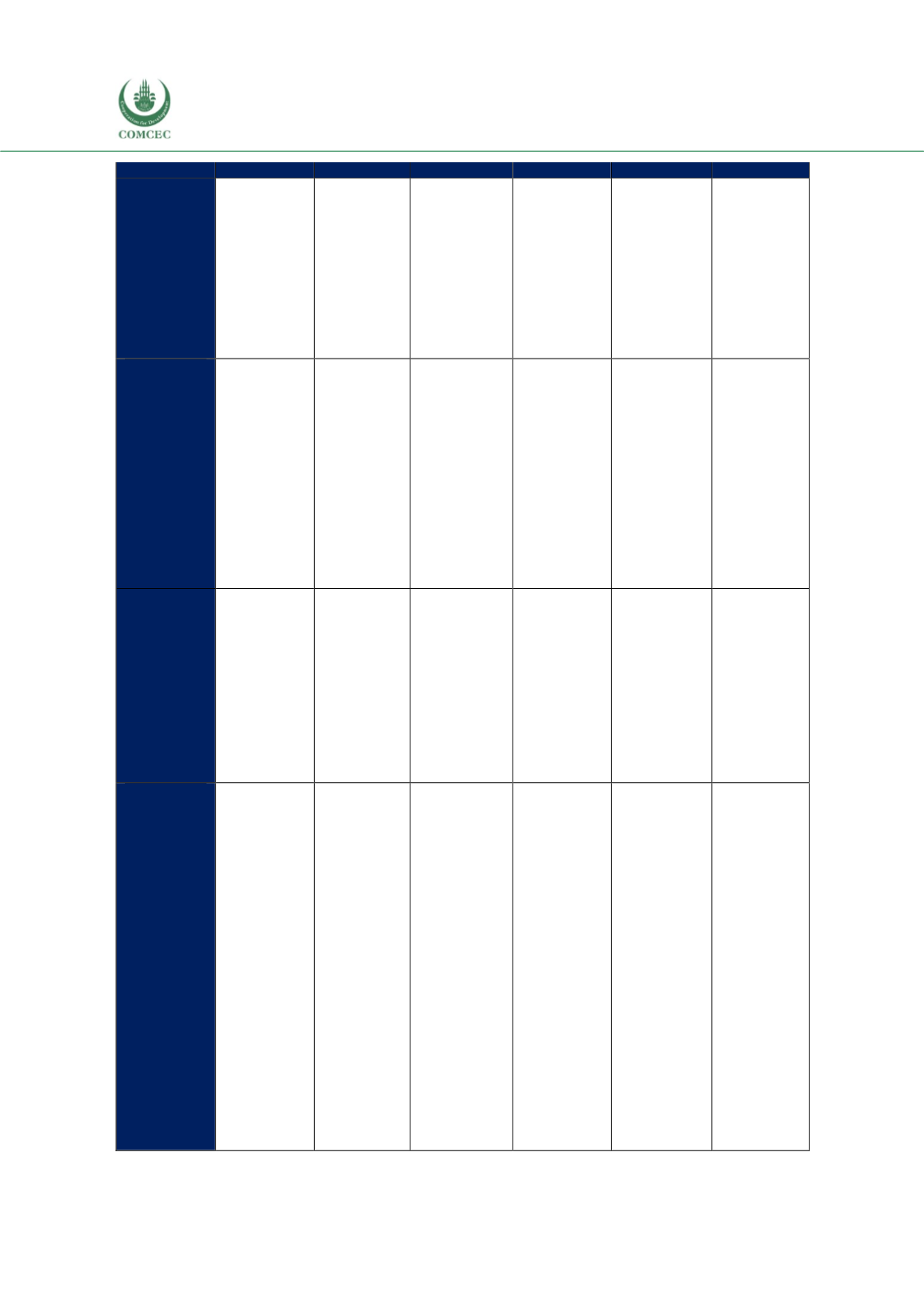

Reviewing Agricultural Trade Policies
To Promote Intra-OIC Agricultural Trade
168
Turkey
Morocco
Gambia
Chad
Thailand
Brazil
Tariff rates
applied to
the top
imported
products
originating
from OIC
Highest for
vegetables
and fruits
Tariff rates
are reduced
for oil seeds
and
oleaginous
fruits
Highest for
beverages
and tobacco
(approx.
20%)
For other
products, the
tariff rates
are generally
low (0.3%-
7.9%)
Highest for
oils, fats,
waxes (20%)
Lowest for
feeding stuff
for animals
(7%)
Highest for
sugar and
vegetables &
fruit (30%)
Lowest for
beverages and
tobacco
(11%)
Considerably
low tariff rates
for the
products
coming from
the OIC
countries
(highest 5%)
Highest
for
vegetables
and
fruits
(20%); lowest
for
crude
rubber (4%)
Change in
tariff rates
applied to
the top
imported
products
originating
from OIC
Tariff rates
declined for:
coffee (from
29.2% to
20.5%), oil
seeds (from
16.9% to
12.5%),
vegetables
&fruits (from
29.4-28.9)
Tariff rates
declined for:
vegetables &
fruits (from
0.8% to
0.7%); oils,
fats, waxes
(from 4.5% to
3.0%); coffee
(from 6.9% to
6.7%);
beverages
and tobacco
(from 22.8%
to 23.7%
Tariff rates
declined for:
beverages and
tobacco (from
20% to 19.9%)
Tariff rates
declined for:
coffee (from
16.5% to
11.9%);
cereals (from
21.1% to
18.7%); misc.
pr. (from
14.9% to
12.3%).
Tariff rates
declined for:
fish (from
4.7% to 1.4%);
misc. pr. (from
4.5% to 0%);
oils, fats,
waxes (from
2.3% to 0.1%);
coffee (from
5% to 1.5%);
cereals (from
4.9% to 4.4%)
Tariff
rates
declined for:
Coffee (from
12.0%
to
11.6);
fish
(10.6%
to
10.0%).
Tariff rates
applied by
the OIC
countries
Highest for
beverages and
tobacco
Highest tariff
rates for
sugars (80%)
Lowest tariff
rate for
feeding stuff
for animals
Highest for
vegetables and
fruits (14.6%)
Oil seeds
(12.3%)
High tariff
rates applied
by the OIC
countries.
Highest on
sugar (13.5%
and cereals
9.8%)
High
tariff
rates applied
by the OIC
countries.
Highest
on
oils, fats and
waxes (20%),
beverages
and tobacco
(19%).
Lowest
on
dairy (9.9%)
NTMs
Nearly 60% of
animal
products are
subject to
NTMs and this
ratio is
around 88%
in vegetables
and close to
100% in hides
and skins.
Food
products and
vegetable are
the main
product
categories
that are being
affected from
the existence
of NTMs.
Food products
is the main
product
category that
is being
affected from
the existence
of NTMs. Half
of the products
in the animal
category and
vegetable
category are
impacted by
NTMs.
NA
In animal
products,
nearly 90
percent of
animal
products are
subject to
NTMs and this
ratio is 80
percent in
vegetables, 90
percent in
Food products
and 100
percent in
hides and
skins. The
wood
products are
the less
protected
category by
NTMs.
100% animal
products and
food products
are subject to
NTMs
















